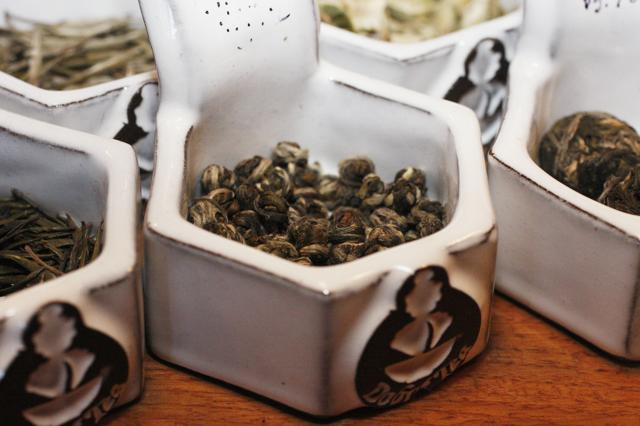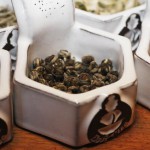- A cup of pearls: Jasmine green tea pearls on display at Dobrá’s service counter. Photos by Jonathan Welch
- Tea nook: Dobrá has a couple of booths to tuck into with a pot of tea and a snack.
- Shoes off: One of the raised platforms in the rear of Dobrá.
Next to water, tea is the most widely consumed beverage on the planet. But in America, where coffee rules, a teahouse is a comparatively rare thing. And, though Asheville has its fair share of coffee shops offering loose-leaf teas, the recently opened Dobrá Tea Room on Lexington Avenue is entirely unique in the area.
Dobrá is not the kind of place where you grab a to-go cup of chai, pay and split. It’s a showplace of tea culture, boasting an astounding variety of leaves in various shades, ages and flavors, gathered by owner Andrew Snavely from distant countries. And if the notion of standing in a field next to a Japanese tea farmer sounds a little utopian (and like it belongs in a Snapple commercial), sit down with Snavely for a few minutes and listen to him to talk about his travels and why he does what he does.
“Tea has always been a part of my life,” says Snavely. “When I moved up to Vermont for college, I found myself drinking tea more than hanging out in coffee shops and preparing tea in my dorm.”
After college, Snavely moved out West, finding himself lingering in the numerous Asian-style tea houses on that side of country. "That's when I really started to appreciate loose tea and the culture," he says. Snavely worked as a tea and herb buyer for a health food store, which enabled him to sample different varieties of teas and gain even further experience. Snavely eventually returned to Vermont, joining the staff of a Burlington Dobrá Tea Room, an offshoot of Dobrá Cajovna, a teahouse opened in Prague after the fall of communism. "People weren't happy with their everyday lives, and the tea room became this safety place," says Snavely. Snavely began managing Dobrá, then accepted an offer to take ownership in 2007. "But before that, starting in 2003, I began visiting the tea countries annually and starting to develop relationships with the tea farmers and producers with the company, our friends in the Czech Republic. We always travel as a family,” says Snavely.
Snavely intended the Asheville shop to be as much of a conversation piece as the tea. Dobrá is housed in a Lexington building that used to be filled with mostly head-shop paraphernalia. Now, it’s a museum of what Snavely gathered from his travels, including some rather esoteric knowledge of tea culture and a wide selection of tea accessories. There’s a collection of maté gourds from South America and some whisks for making a frothy traditional Japanese tea brew. There are books about tea — even the menu is a tome. Snavely's knowledge of Dobrá's products alone borders on encyclopedic. Every tea in the shop has a story, he says, and most of them have quite a history. Many of the strains have been cultivated in their respective countries through generations.
Take the Putuo Fo Cha, for example, also known as the Buddha's tea, harvested from the Island of Putuo. Here's how the menu describes it: "A very special, small harvest, Putuo Fo Cha is a light, flowery green tea. The two-and-a-half-thousand-year old tradition of cultivating gourmet tea on the Putuo island guarantees that this particular tea, grown in the gardens of the Buddhist monastery and processed only by hand, will always be of superior quality."
Twenty-five hundred years? Just the fact that the tea is grown on an island with tea ceremonies older than the concept of Christianity is enough to make Dobrá a point of interest. And it's the ceremony, the sense of community and the ancient tradition behind the sharing of tea that's part and parcel of the experience that Snavely wants to provide with Dobrá, he says.
To that end, Snavely still travels to far-flung regions to collect his teas, rather than simply having them shipped. Of course, a business trip to the tea fields of China might not be such a burden. But, it's part of his model. Snavely now has direct contact with the growers and producers of approximately 90 percent of the teas on the menu, which means he gets direct exposure to the traditions surrounding the teas. "We're taking these traditions that we've learned and we're bringing them back to Asheville," he says.
It's a romantic, exotic notion, and one that Snavely relishes. "Having that hands-on experience of witnessing and experiencing tea growing on different mountains and in different climates, villages and regions really develops that hands-on, fair-trade, beautiful kind of relationship with the producers. It's a farm-to-table relationship," says Snavely.
And it’s one way, he says, to provide a taste of world culture and tradition for much less than the price of a plane ticket.
"We're selling an experience, we're not selling just a cup of tea," Snavely says. "People say that when they come in here, they feel transported. Not many people in this day and age can really afford to travel to Morocco or Egypt and experience these types of things. But at Dobrá, people can feel like they're in a far-off place for an affordable price and go for an adventure daily, if they want to."
And, to hear Snavely tell it, some of his tea adventures might not be for everyone. One of his favorite trips involved traveling to a remote mountain village in Laos, a journey that necessitated a number of flights, followed by a 15-hour ride in the back of a jeep over rough roads. The vehicle, he says, barely clung to the sides of steep mountains at times, having to navigate around mudslides and the occasional cluster of donkeys.
Once in the village, Snavely met elder tribeswomen who spent their days harvesting tea leaves from 800-year-old trees. During the evenings, the villagers snacked on bizarre foods that would make Andrew Zimmern blush. "I never felt so far away from my own reality. I ate a lot of strange rodents," says Snavely. "I got really sick. But, that was okay."
Rodents, thankfully, are not part of the food offerings at Dobra, but the tea house does provide a menu of other world flavors. There's hummus, dolmas, baba ganouj, a couscous dish cooked in a traditional Moroccan tagine. Locally made desserts are specially crafted to work with a tea house. Dishes lean toward the herbal, more savory flavors of the sweet spectrum: ginger snap cookies, a lavender cake, shortbread tea cookies.
And beverages aren't limited strictly to leaf extractions. Snavely pulls out a wooden drawer from an apothecary-type wall, revealing a pile of what looks like course-ground cocoa powder. It's chagga, ground from a wild fungus with a woody texture.
And from what far-flung region did Snavely find this chagga? It came from a local wild-foods specialists, he says, who hand-harvested it from forest near Asheville. His tea gathering trips aren't necessarily about visiting the misty mountains of Japan and the dry plains of Kenya. "Authenticity is really what I strive for, so visiting these places is about research, gathering knowledge," he says. Tea, like wine, tells a story of terroir as well as tradition, says Snavely. "It's botany, it's art, it's alchemy, it's everything," he says.
— Send your food news and story ideas to Mackensy Lunsford at food@mountainx.com.






Before you comment
The comments section is here to provide a platform for civil dialogue on the issues we face together as a local community. Xpress is committed to offering this platform for all voices, but when the tone of the discussion gets nasty or strays off topic, we believe many people choose not to participate. Xpress editors are determined to moderate comments to ensure a constructive interchange is maintained. All comments judged not to be in keeping with the spirit of civil discourse will be removed and repeat violators will be banned. See here for our terms of service. Thank you for being part of this effort to promote respectful discussion.